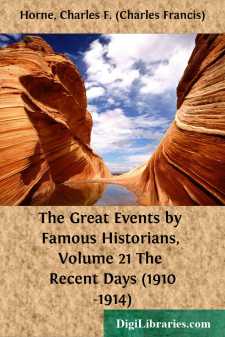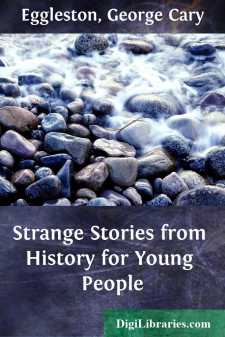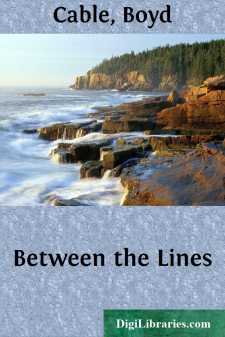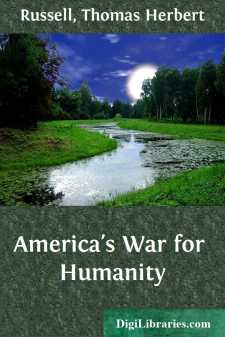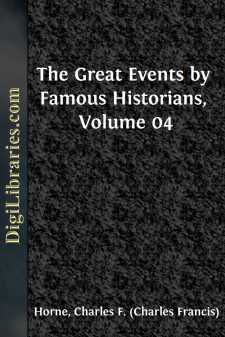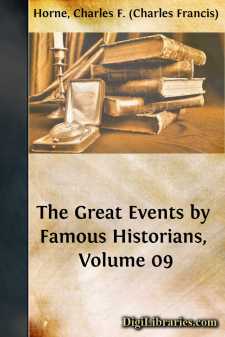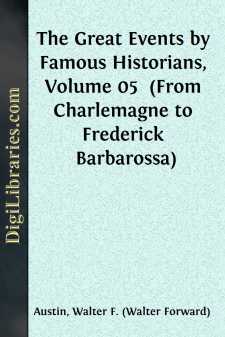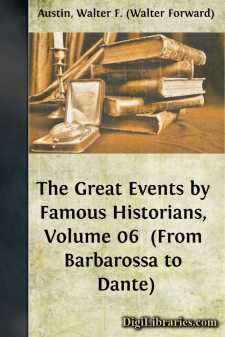History
- Africa 30
- Americas (North Central South West Indies) 50
- Ancient 68
- Asia 58
- Australia & New Zealand 8
- Canada 41
- Caribbean & West Indies 1
- Civilization 20
- Eastern Europe 12
- Europe 310
- Expeditions & Discoveries 60
- General 77
- Historical Geography 1
- Jewish 9
- Latin America 3
- Medieval 8
- Middle East 13
- Military 248
- Revolutionary 8
- Study & Teaching 5
- United States 353
- Western Europe 56
- World 13
History Books
Sort by:
AN OUTLINE NARRATIVE TRACING BRIEFLY THE CAUSES, CONNECTIONS, AND CONSEQUENCES OF THE GREAT EVENTS THE RECENT DAYS (1910-1914) CHARLES F. HORNE The awful, soul-searing tragedy of Europe's great war of 1914 came to most men unexpectedly. The real progress of the world during the five years preceding the war had been remarkable. All thinkers saw that the course of human civilization was being...
more...
During the war of 1812-14, between Great Britain and the United States, the weak Spanish Governor of Florida—for Florida was then Spanish territory—permitted the British to make Pensacola their base of operations against us. This was a gross outrage, as we were at peace with Spain at the time, and General Jackson, acting on his own responsibility, invaded Florida in retaliation. Among the British...
more...
by:
Boyd Cable
BETWEEN THE LINES THE ADVANCED TRENCHES 'Near Blank, on the Dash-Dot front, a section of advanced trench changed hands several times, finally remaining in our possession.' For perhaps the twentieth time in half an hour the look-out man in the advanced trench raised his head cautiously over the parapet and peered out into the darkness. A drizzling rain made it almost impossible to see beyond a...
more...
uring the eighteenth century a remarkable change swept over Europe. The dominant spirit of the time ceased to be artistic as in the Renaissance, or religious as in the Reformation, or military as during the savage civil wars that had followed. The central figure of the world was no longer a king, nor a priest, nor a general. Instead, the man on whom all eyes were fixed, who towered above his fellows,...
more...
DEDICATION To the soldiers and sailors of the United States and Canada; to the men of the armies and navies of nations allied with us; to the splendid courage and devotion of American, French, British and Belgian women, who have endured in silence the pain of losses worse than death, and never faltered in works of mercy for which no thanks can ever pay; to all the agencies of good that have helped save...
more...
CHARLES F. HORNE Our modern civilization is built up on three great corner-stones, three inestimably valuable heritages from the past. The Græco-Roman civilization gave us our arts and our philosophies, the bases of intellectual power. The Hebrews bequeathed to us the religious idea, which has saved man from despair, has been the potent stimulus to two thousand years of endurance and hope. The Teutons...
more...
CHARLES F. HORNE It is related that in 1661, on the day following the death of the great Cardinal Mazarin, the various officials of the State approached their young King, Louis XIV. "To whom shall we go now for orders, Your Majesty?" "To me," answered Louis, and from that date until his death in 1715 they had no other master. Whether we accept the tale as literal fact or only as the...
more...
THE GREAT EVENTS (THE REFORMATION: REIGN OF CHARLES V) CHARLES F. HORNE Our modern world begins with the Protestant Reformation. The term itself is objected to by Catholics, who claim that there was little real reform. But the importance of the event, whether we call it reform or revolution, is undenied. Previous to 1517 the nations of Europe had formed a single spiritual family under the acknowledged...
more...
AN OUTLINE NARRATIVETRACING BRIEFLY THE CAUSES, CONNECTIONS, AND CONSEQUENCES OF THE GREAT EVENTS(FROM CHARLEMAGNE TO FREDERICK BARBAROSSA) CHARLES F. HORNEThe three centuries which follow the downfall of the empire of Charlemagne laid the foundations of modern Europe, and made of it a world wholly different, politically, socially, and religiously, from that which had preceded it. In the careers of...
more...
TRACING BRIEFLY THE CAUSES, CONNECTIONS, AND CONSEQUENCES OF GREAT EVENTS (FROM BARBAROSSA TO DANTE) CHARLES F. HORNE It was during the period of about one hundred fifty years, extending from the middle of the twelfth to the close of the thirteenth century, that the features of our modern civilization began to assume a recognizable form. The age was characterized by the decline of feudalism, and by the...
more...


